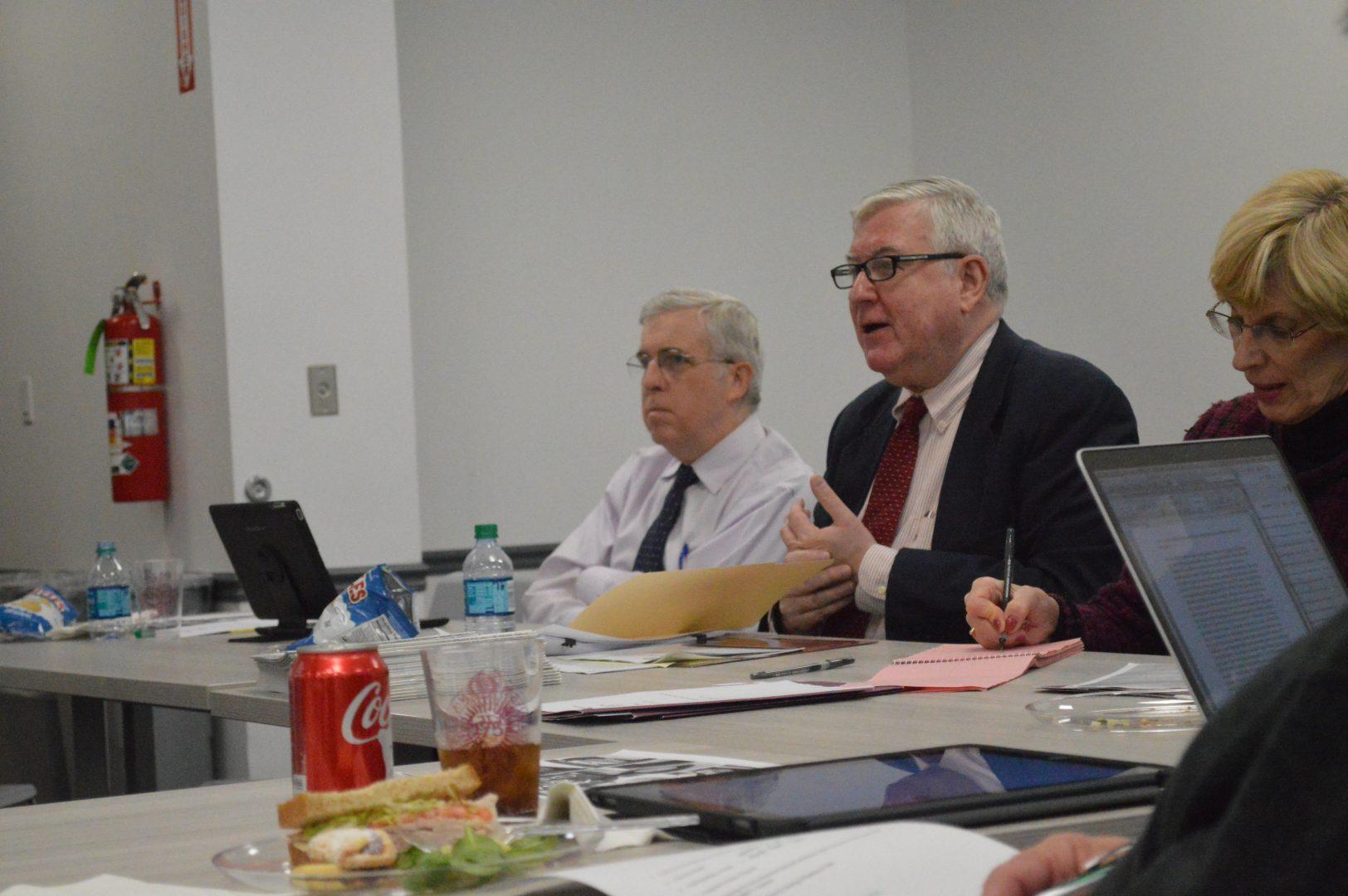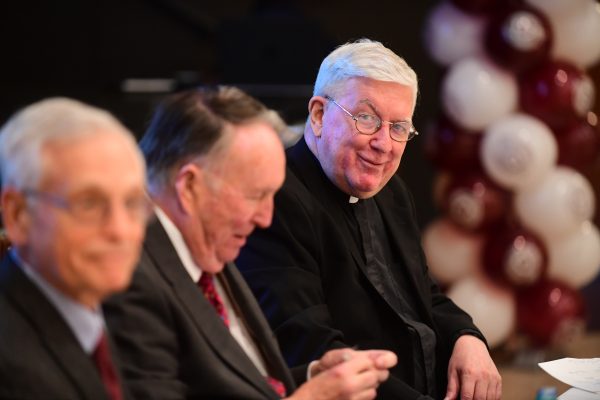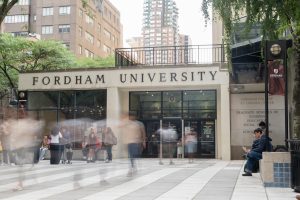Grimes Ends Run as Longest-Serving Dean
August 6, 2018
The 2018 fall semester will mark the first time in 20 years that Fordham College at Lincoln Center (FCLC) will open its doors without Rev. Robert R. Grimes, S.J. at its helm. Grimes, who holds the title of Fordham’s longest-serving dean, led the college during its formative years and helped develop the campus’ current artistic and scholastic visions. After entering office during one of FCLC’s most turbulent periods, Grimes went on to establish the programs, facilities and student life initiatives that increased the campus’ standing both within Fordham University and nationally as an independent academic institution.
Grimes began his Fordham career in the fall of 1970 when he arrived as an undergraduate at Fordham College at Rose Hill (FCRH), then known simply as Fordham College, for his freshman year. One year earlier, the Lowenstein Center had opened downtown at what would eventually be called FCLC. Even in these early years at Fordham, Grimes recalls an eager fascination with the sister campus. “I always used to say Fordham had never really looked at what the possibilities are at Lincoln Center,” he said. “That’s something I’ve been thinking about from my college days.”
While Grimes remembers his first years at Fordham fondly, living with friends off-campus on Baybridge Avenue, his admission to Jesuit studies called him to the Jesuit Novitiate at Le Moyne College in Syracuse in 1972 where he began his Catholic scholarly formation. After returning to New York City two years later, he resided at Fordham for a total of six years, first finishing his Bachelor’s of Arts in Minor Languages and his Jesuit philosophy studies at Fordham and then a Bachelor’s of Music at the nearby Manhattanville College.
Grimes credits these first years at Fordham with stimulating his love for academia, recounting a particularly difficult battle against a computer programming as a “click” moment that set him on the road toward further schooling and his eventual decision to “spend [his] life at a university.” In a story he often tells incoming freshmen, Grimes recounts one night during his Fordham years that he spent hours poring over a computer program before finally uncovering the solution. “It was the first time in my life I realized how fun the intellectual life can be, how much enjoyment you can get out of it.”
Soon after he finished his studies, Grimes embarked on his academic career by teaching and studying across the Northeast; he taught high school in New Jersey, studied theology in Cambridge, Mass., worked in campus ministry as Des Moines College and received a Ph.D in music at the University of Pittsburgh. Finally, in 1992, Grimes returned to Fordham, this time as tenure track faculty at Rose Hill teaching music – but within two years, Lincoln Center would be knocking at his door.
In 1994, ostensibly due to the absence of Jesuits residing or teaching at FCLC, Grimes was asked to teach half his classes at Lincoln Center and move into McMahon Hall, which was then lacking any Jesuit residents. With his office in Faculty Memorial Hall at Rose Hill and his bed in McMahon, Grimes said he remembers this chapter of his career consisted of “lots of time on the Ram Van.”
More importantly, Grimes claimed that his time teaching on dual campuses only increased his interest in FCLC at a time when the college was not very well respected uptown. FCRH’s enrollment numbers, program diversity and SAT entrance scores all surpassed FCLC’s, which Grimes suggested led some Rose Hill faculty members to “not have a very high view of LC.”
“I always said I thought it was really important for a faculty member to teach on the other campus at least once, because it dispels myths about the other campus,” Grimes said. “I came back and just started talking about how wonderful the students were at Lincoln Center.”
One of Grimes’ favorite stories to illustrate the differences he encountered between the two campuses is a comparison of students’ reactions to modern music his Intro to Music History course. “Rose Hill students have a lot to say, however, they’re somewhat shy in saying it,” Grimes said of his general observations, “But Lincoln Center students speak whether they have anything to say or not.”
It’s this outgoing, unbridled Lincoln Center spirit that Grimes admired when he began teaching at Lincoln Center: “Lincoln Center students will get bored if you don’t show them new things. And that makes for an interesting classroom.”
Three years after Grimes’ move to LC, he was asked by Rev. Joseph O’Hare, S.J., then president of Fordham, whether he had ever thought about entering an administrative role. “And I said ‘no,’” recalled Grimes, “I had no interest in doing it.” Upon hearing the role in question was dean of Lincoln Center, Grimes admitted the prospect was, simply, “intriguing.”
“And the next thing I know, I was appointed the interim dean of FCLC.” Grimes laughed. “‘Intriguing.’ That’s all I said! Why I said yes, I have no idea.”
Upon entering office, Grimes had a simple mantra: “Survive. Always think before you speak and don’t do anything stupid.” His first weeks, he admitted, were riddled with confusion; he recalled sitting through an entire meeting with a representative of the Institute of Modern Language and Culture, one of the four colleges housed at Lincoln Center, before realizing he was her supervisor. As a result, Grimes spent most of his first year consulting former deans for information as he began working on some of the college’s most formative decisions.
Grimes entered his leadership role during “restructuring,” a period of time during which administrators at Rose Hill and Lincoln Center were changing undergraduate education to better integrate the two colleges. The goals of restructuring generally focused on streamlining the many academic institutions within Fordham, such as implementing a new, standardized curriculum across the two colleges, joining faculty from both campuses into cross-campus departments and separating the School of Professional and Continuing Studies out of FCLC to reduce the number of colleges under a single dean.
“Most of the time, the college was in trouble,” said Grimes of Lincoln Center’s history. In reference to his personal introduction to the college during restructuring, Grimes said, “This was one of the worst times.”
One controversial proposition included joining FCRH and FCLC together into one college with a single dean at Rose Hill. Lincoln Center students vehemently opposed the idea and staged protests, petitions and walkouts against the proposal. They conducted their largest demonstration, a sit-down protest on the 11th floor of Lowenstein, during the last meeting of the Board of Trustees regarding final decisions on restructuring in 1997. Grimes, still in his first year acting as interim dean at the time, recalled the incident as a turning point for his own induction to FCLC.
“Well, the Dean of Students and I had to tell them how to do a protest,” Grimes recalled. He aided the students’ cause, instructing them to remain seated and directing trustees to walk through the crowd rather than traveling to the 12th floor. The trustees eventually invited a student representative up to the meeting to discuss the college’s concerns about restructuring, which ultimately resulted in the board’s decision to keep the two colleges separate, joining only their PCS programs.

After his initial, hard-earned success, Grimes began his official run as dean in 1998 with a clear goal in mind: “Make sure Fordham College Lincoln Center was respected in the university and outside the university.”
“We had to convince people that FCLC was a great school,” said Grimes. He strove to ensure FCLC gained recognition as a qualified institution not only within the Fordham family, but also as an independent college.
Grimes began his efforts by applying for membership to Phi Beta Kappa, a widely-esteemed national academic honors society established in 1776. Though FCRH received the honor in 1962, FCLC’s foundation 6 years later meant it was not counted as an established chapter. Grimes remedied the situation within two attempts, inducting FCLC into the academic fraternity in 2000.
The new dean then turned to one of the most pressing subjects facing FCLC’s future and one of his greatest feats: increasing undergraduate enrollment. By the time Grimes took office, incoming class populations had reached numbers as low as 110 students (compared to the 607 freshmen entering the college at the end of Grimes’ run in 2019). To incentivize enrollment, Grimes focused his efforts on cultivating student life, primarily extracurriculars. At the beginning of his career, FCLC was home to three student clubs (only one of which, the Observer, still exists today); thanks to the money and effort funneled into increasing budgets for clubs and finding faculty willing to volunteer as mentors, students soon found spirit and pride in extracurriculars. Debate society, one such club, rose to national status by just its second year.
“I have to admit, it was wonderful going to enrollment meetings in those years,” said Grimes. He remembered watching the college’s social and academic statistics climb over the years: “I watched the Rose Hill SATs and the FCLC SATs surpass Rose Hill’s. I wasn’t obnoxious on that,” he added quickly, “Everybody was going up.”
As the college increased in popularity, Grimes developed many university programs to expand and strengthen FCLC’s academic core that remain integral parts of the curriculum today. The college’s expansive language department, for example, is largely due to Grimes’ love for language and faith in students’ appreciation for it. He recalled that his attention was first brought to the issue when Rose Hill dropped Russian as a language option, to which Grimes replied: “no self-respecting university can not teach Russian.” He decided to keep the language on for one more year, during which the program began to attract more students; a similar pattern emerged when Grimes allowed Arabic, a program with a total student population of 3, to continue another year.
Both programs developed into popular additions to the language department and set the standard for Grimes’ expansion of other programs. Following these successes, Grimes then added Japanese and Mandarin classes to the curriculum, first in conjunction with the Gabelli School of Business and then as independent programs. Reflecting on his own interest in language, Grimes did lament the decline of Ancient Greek as a study at Lincoln Center, though it remains alive at Rose Hill.
Many of the science facilities at LC were built under Grimes’ supervision as a means to foment the college’s academic endeavors. While he admits he knew from the very beginning that a chemistry lab would likely never grace campus, Grimes does take pride in the 8th floor physical science and neuroscience labs, as well at the 6th floor computer labs of which he oversaw construction.
One of the most distinctive manners in which Grimes led FCLC to acclaim was through curating a presence for the college in the New York art scene. During his time as dean, Grimes helped his colleagues and fellow administrators develop artistic opportunities integral to Lincoln Center students’ current experience, including the Ailey/Fordham B.F.A. Program and partnerships with The Juilliard School and Jazz at Lincoln Center. Grimes also actively worked to spread word of FCLC’s artistic talent; when Grimes heard that the nearby Rubenstein Auditorium invited open performances, he “was there in a flash” with acts from the theater department, Alvin Ailey dancers and even hosted sessions of Poets Out Loud to showcase Lincoln Center’s talent.
“I wanted LC to be recognized as a vibrant part of the university, and, to be quite honest, for quite a while, it was not considered that,” said Grimes.
For many years, Grimes recounted, Rose Hill administrators appeared unimpressed by the sister campus; however, their in-person interactions with FCLC under Grimes’ leadership often inspired new respect for the college. He specifically remembers one distinguished professor’s trek downtown brought him to an Alvin Ailey performance that surprised in him terms of quality. “And he came out,” Grimes recalled, “And he said to me, ‘I didn’t know Fordham did anything this well.’ He was amazed, and it totally changed his view of what FCLC was.”
The star power of the Lincoln Center campus has also had its effect on Grimes himself, who admits presiding over an institution at such a busy cultural hub has offered him incredible opportunities. His network of contacts includes Franklin Delano Roosevelt’s great granddaughter, television personalities like Al Roker, business contacts in industries like TESLA and has even granted him a phone call with the general manager of the Metropolitan Opera.
Still, Grimes said, he’s most awed by his music contacts, big and small. “I’m a musician,” he said. “The fact that I could be on a first name basis with someone as famous as Judith Jamison– it blew my mind.” Similarly, his role as a music teacher has borne him equally amazing results: while he says it doesn’t happen frequently, some of Grimes’ visits to the New York Philharmonic or Met Opera have resulted in someone approaching him and telling him the reason they’re there is because of he taught them about music during their college years.
Grimes currently resides with other retired Jesuits in Murray-Weigel Hall, the same place where he studied as a young scholar. He continues to improve facilities and policies wherever he goes–upon arriving to Murray-Weigel, Grimes said he campaigned for a broken sidewalk outside of the building to be replaced and was granted his wish within the month. In his room, he has a copy of his latest published project, an extensive 50 year history of FCLC, and all the materials for his next research endeavor into the musical history of a Jesuit Church on 16th Street.
The former dean stepped down due to medical complications at the behest of the university, but will return for the 2018-19 academic year in the newly created role of vice dean. While the position’s specific duties are as of yet unspecified, Grimes looks forwards to pursuing the goals he “always wanted to do and never had the time to do” during his time as dean. These include drafting official agreements concerning a partnership program with Juilliard, developing the Catholic Studies department at FCLC, and setting out a plan to instate curriculum and facilities for a new, state-approved Bachelor’s degree in “cutting edge musical theater.” After his year as vice dean, Grimes will take a year-long sabbatical before returning to Fordham as a university professor and dean emeritus.
Looking back on his time at Fordham, Grimes says he believes FCLC is now “fully respected within the university,” though he does wish he made the college better known outside of Fordham. “But it’s hard,” he said, “We’re in a difficult situation in some ways, in that there’s so much around us it takes focus away from the college.”
In the future, Grimes hopes FCLC will continue to expand its programs, increase enrollment and gain national recognition. He says he hopes it won’t grow much larger than its current 2,100 student population (which he says he placed as the “perfect target population” when he entered office) for fear of losing the tight-knit campus community.
As for his role as dean, Grimes said he already misses the office as much as FCLC will miss the man that saw it through its most difficult years into its most prosperous.
“To be quite honest,” Grimes said of his term as dean, “it was my dream job. I didn’t know it at the time. I didn’t know until I got into it. But I loved every minute of it. And I realized it was, in a sense, what I was born to do. For me, it was just the perfect fit. And I wish it could’ve gone on a little longer.”










